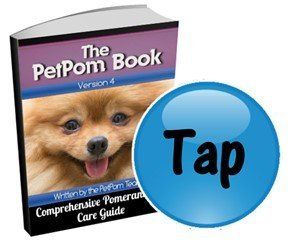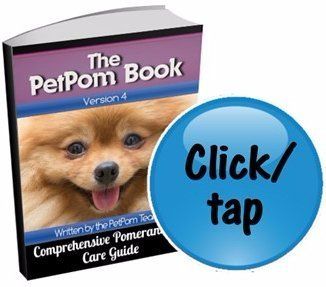Not Gaining Weight
PetPom

The
Pomeranian
Information
Center
Pomeranian Puppy Not Gaining Weight
And Adult Poms That Have Trouble Maintaining Weight
Overview
This is a small toy breed (one of the smallest), given a breed standard weight of 3 to 7 pounds; therefore, any issues with growth will be of top concern. It is not uncommon for a Pomeranian to struggle a bit with weight gain during the puppy stage or to have trouble maintaining as an adult. This section will cover:
- Reasons why a puppy may not be gaining as he should
- Causes of weight loss in adults
- Red flags that warrant veterinary attention
- Steps you can take at home to encourage weight gain
__1457711459_73-197x324.dm.edit_hM009t.17.32.39-1920w.jpg)
Eevee at 8 months
Photo courtesy of Casey
When a Puppy is Not Gaining or an Adult is Losing Weight
Pomeranian puppies grow in spurts and stalls, eventually ending up at their adult weight by the 1 year mark. For some, a bit of growth will occur up until 15 months. Newborns double their weight in just a day and the first 8 weeks is the time period when weight gain is the most rapid. However, from the age that a Pom goes to his new home (usually at the 2 month mark) and up until the 10 month mark, weight gain should be steady, slowing down as the Pomeranian reaches his final adult size.
If a Pomeranian puppy
is not gaining as he should, steps must be immediately taken to ascertain the cause.
For adult Pomeranians, while it is normal for there to be some seasonal fluctuations of a pound or so, it’s never normal for there to be a significant weight loss.
In many cases, this will be due to:
Parasites.
Worms can prevent a puppy from gaining weight. Both hookworms and roundworms are common with puppies and this is why a de-worming program should be started at the 2 week mark. Even so, a puppy can re-infect himself by ingesting his feces
(worms and eggs shed into the stool).
With Pomeranians of any age, worms can be caught via fleas (even from just one that jumps onto the Pom from another dog) or from ingesting the feces of other dogs. Your vet can check for parasites via a stool sample and an appropriate de-worming medication can be given.
Quality of food.
Providing an excellent diet at all times during your Pomeranian’s life is vital for maintaining good health, however it is never so crucial as during the first year when the puppy needs to be gaining weight. Lack of proper growth or trouble maintaining may be due to insufficient nutrition. One of the most common mistakes that owners make is to choose what’s in the dog food aisle at the supermarket. Most of these well-known brands are notorious for lacking what a dog truly requires.
Fillers are by far, the biggest culprit. In an effort to lessen productions costs, many companies will add fillers to the base of the food. These are worthless ingredients that ‘bulk up’ the food to make it appear as if there is a lot, however these ingredients offer no nutritional value and are simply expelled out when the dog goes to the bathroom. Common fillers that can prevent a Pomeranian from gaining weight or have trouble maintaining include: corn bran, rice bran, oat hulls, cereal by-products, feathers, soybean hulls, cottonseed hulls, peanut hulls, rice hulls, wheat mill run, citrus pulp, modified corn starch, weeds, and straw.
If your Pom puppy is not gaining as he should or your adult has trouble keeping his weight up, do reassess his diet, including his main meals
and his snacks.
Underfeeding.
While this toy breed dog does not require a lot of calories, there can be instances of misunderstanding in regard to food consumption. For example, an owner may place out a meal 3 times a day, allow for 15 minutes and take the bowl away after the amount of time. However, some Poms cannot eat enough during that time; the small stomach does not allow for it. And having only those 3 meals is not enough. In these cases, you will want to experiment with offering 4, 5 or even 6 smaller meals throughout the day. While the Pom will eat less at any one given meal, he will eat more over the course of the day.
Stress.
This is an intuitive breed that can become upset during times of stress, with the effects of that carrying over into lack of appetite and other signs of emotional turmoil. While separation anxiety is common cause of high stress for the Pomeranian, other such things as a chaotic household (yelling, etc.) can have an effect.
In addition, changes such as moving to a new home or the introduction of a new pet can cause a temporary withdrawal from food. There are steps you can take to help resolve issues of separation anxiety
and of course, any household disturbances should be dealt with as to provide a calm, happy environment. In regard to a Pomeranian having trouble with a change, time must be given for the transition, while trying to keep as much familiarly as possible; i.e. in a new home, food and bed are placed in the same areas (to the left of the fridge, to the right of the sofa, etc.)
Dental Issues.
Seen most often with adult Pomeranians, problems with the teeth can lead to trouble eating, and therefore, weight issues. Even if you brush your Pom’s teeth at home with a proper toothbrush and quality tooth paste, plaque and tartar can accumulate, growing under the gum line and causing infection. Such things as loose teeth or tooth pain can certainly cause problems with eating. You will want to have this ruled out as a possible reason.
__1457712697_73-263x338.dm.edit_GTHs4w.17.32.39-1920w.jpg)
Molly, at 8 months
Photo courtesy of Johnny Hallak
Medial Issues.
The number of health conditions that can lead to a puppy having trouble gaining weight or that will cause an older dog to struggle with maintaining, are vast. The majority of diseases and health issues have ‘decreased appetite’ as a symptom. If the previously listed issues are not applicable and at-home attempts to encourage increased weight do not work, you will want to bring your Pomeranian to the vet for a full and complete checkup.
Steps to Try and Encourage Weight Gain for Puppies or Maintenance for Adult Poms
1.
Have all possible health issues
rules out, including dental problems
2.
Reassess your Pom’s diet. While we recommend Orijen, you will want to obtain a 4 or 5 star food.
3.
Feed smaller, yet more frequent meals throughout the day, with the overall goal being a slightly larger quantity over the course of the day.
4.
For Poms that have trouble with hard kibble, you may wish to make a switch to canned wet food, home cooked food or soften the kibble with low-sodium chicken or beef broth and warm it up before serving.
5.
For Pomeranians that are eating well, but still having problems, you may wish to offer a prozyme powder supplement. This is considered to be a safe supplement that can help a puppy or dog better absorb nutrients. It also helps with minor to moderate issues with upset stomach, diarrhea, gas and even coprophagia.
6.
With your vet’s approval, you may wish to add 100 to 150 more calories per day. Since the Pomeranian is not apt to actually eat more food, this can be accomplished by adding non-filling ingredients to his main meal. You can add 1 tablespoon of salmon fish oil (123 calories) to his kibble for ONE meal, each day. Most dogs love the taste of this and it adds calories without adding any extra bulk. This alone may allow your Pomeranian to slowly gain weight; give it 2 to 3 weeks.
For an extra boost, you may also wish to add 1/4 cup of whole cottage cheese (55 calories) per day.
Please note:
When a puppy is not growing as he should or an adult is losing weight, do please have the dog seen by the veterinarian. To try and treat this at home without first ruling out diseases and illness puts your Pom’s life in jeopardy.

Lulu, 3 years old, Photo courtesy of Lyn
Popular Pages:
What is the Best Shampoo for a Pomeranian
- Taking a look at the qualities needed for bath products to properly clean, moisturize and protect a Pom's coat.
What to do if Pomeranian is Stung by a Bee
- Also covers wasps, hornets, yellow jackets and other flying, stinging insects.
Best Harness for Pomeranians
- An important article explaining why collar-to-leash can be tragic and which harnesses are easy to put on and super comfortable.
Things to Do Now:
Become a Free PetPom Member
(if you are not already a Member) so that you'll receive a friendly reminder when we add new info to the site. You will also receive a fun & helpful Welcome Booklet.
Things to Do Now:
Become a Free PetPom Member
(if you are not already a Member) so that you'll receive a friendly reminder when we add a new Topic of the Month to this Pomeranian blog & when we add new pages and sections to the site!
You will also receive a fun & helpful Welcome Booklet.
Find out about the most comprehensive Pomeranian book that exists
- Now in Print.
If you email photos to us, you agree that PetPom is given free copyright to use at our discretion. We will always credit the photo to the name of the Pom's owner(s) if it is supplied.
Email: Contact@PetPom.com
All text, images and artwork protected by US and International copyright laws. All rights reserved. Copyright PetPom.com
We are a participant in the Amazon Services LLC Associates Program, an affiliate advertising program designed to provide a means for us to earn fees by linking to Amazon.com and affiliated sites.


